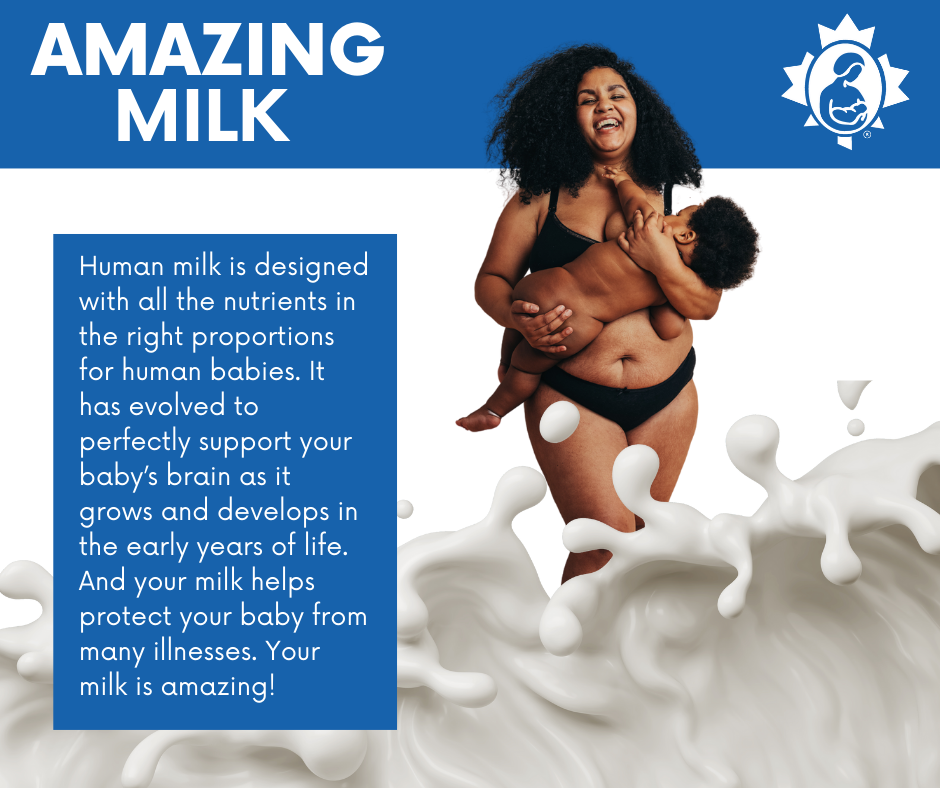
Is designed for human babies
Human milk is designed with all the nutrients in the right proportions for human babies. It is a complete food for the first six months of life or longer. Mothers all over the world, eating many types of foods, have similar nutrients in their milk. If a mother is very malnourished her milk can have low amounts of some nutrients, but this is extremely rare in Canada.
Supports brain development
Human milk is perfectly designed to meet the developmental needs of human babies. Our babies are born with only 25% of their brain power. That means that your baby’s brain will do most of its development after birth. Human milk has evolved to perfectly support your baby’s brain as it grows and develops in the early years of life.
Protects against illnesses
When you or your baby breathe in a germ (virus or bacteria) like influenza, COVID, RSV, or the common cold, your body starts to produce antibodies. When your baby is exposed to a germ, the same thing happens. These antibodies enter your milk. They help your baby fight off the illness. As long as your baby breastfeeds, he will benefit from increased immunity against the many germs you and your baby encounter each day.
Babies who receive human milk experience a number of health benefits. Babies who do not receive human milk have an increased risk of:
- respiratory infections
- ear infections
- digestive diseases
- eczema
- diabetes
- childhood leukemia
- meningitis
- necrotizing enterocolitis
- obesity
- SIDS
Creates a healthy gut microbiome
The “gut microbiome” is the micro bacterial community that exists in the gut of every human being. There are billions of microbes in our bodies. They change and adjust throughout our lives. The role of these microbes is known to be both digestive and protective. Breastfeeding until at least nine months of age increases the prevalence in the baby’s gastrointestinal tract of Lactobacilli and Bifidobacteria. These species contribute to the development of a healthy immune system. Human milk contains prebiotics and probiotics that naturally protect the baby’s gut. Studies show that a baby has the best chance of growing up healthy by being breastfed.
Your milk is amazing. It’s just what your baby’s body needs. It provides the food your baby needs to grow and the immunity your baby needs to stay healthy. Your milk is important for your baby.
Related additional information
The Importance of Breastfeeding for Women's Health
Environmental Impact of Breastfeeding
If you have any breastfeeding questions or concerns, contact your local La Leche League Canada Leader for information and support. The calendar of virtual and in-person meetings offers many options for support.
References
Bergstrom, A., Skov, T. H., Bahl, M. I., Roager, H. M., Christensen, L.B., Ejlerskov, K. T., Molgaard, C., Michaelsen, K. F., Licht, T. R. (2014). Establishment of intestinal microbiota during early life: A longitudinal, explorative study of a large cohort of Danish infants. Applied and Environmental Microbiology, 2014;
Fern R. Hauck, F. R., Thompson, J., Tanabe, K. O., Moon, R. Y., Vennemann, M. M. (2011). Breastfeeding and reduced risk of sudden infant death syndrome: a meta-analysis Pediatrics. 128 (1): 103–110.
Frank, N.M., Lynch, K.F., Uusitalo, U. et al. (2019). The relationship between breastfeeding and reported respiratory and gastrointestinal infection rates in young children. BMC Pediatr 19,
Herrmann, K., Carroll, K. (2014). An exclusively human milk diet reduces necrotizing enterocolitis. Breastfeed Med. May;9(4):184-90. doi: 10.1089/bfm.2013.0121.
Horta, B. L., De Lima, N. P. (2019). Breastfeeding and type 2 diabetes: Systematic Review and meta-analysis. Current Diabetes Reports, 19(1), 1.
Li R, Dee D, Li CM, Hoffman HJ, Grummer-Strawn LM. (2014). Breastfeeding and risk of infections at 6 years. Pediatrics. Sep;134 Suppl 1(Suppl 1):S13-20. doi: 10.1542/peds.2014-0646D.
Munblit, D., Peroni, D. G., Boix-Amorós, A., Hsu, P. S., Van't Land, B., Gay, M. C. L, Kolotilina, A., Skevaki, C., Boyle, R. J., Collado, M. C., Garssen, J., Geddes, D. T., Nanan, R., Slupsky, C., Wegienka, G., Kozyrskyj, A. L., Warner, J. O. (2017). Human Milk and Allergic Diseases: An Unsolved Puzzle. Nutrients. Aug 17;9(8):894. doi: 10.3390/nu9080894
Rudant, J., Orsi, L., Menegaux, F., Petit, A., Baruchel, A., Bertrand, Y., Lambilliotte, A., Robert, A., Michel, G., Margueritte, G., Tandonnet, J., Mechinaud, F., Bordigoni, P., Hémon, D., & Clavel, J. (2010). Childhood acute leukemia, early common infections, and allergy: The ESCALE Study. American journal of epidemiology, 172(9), 1015–1027.
Updated 2024
